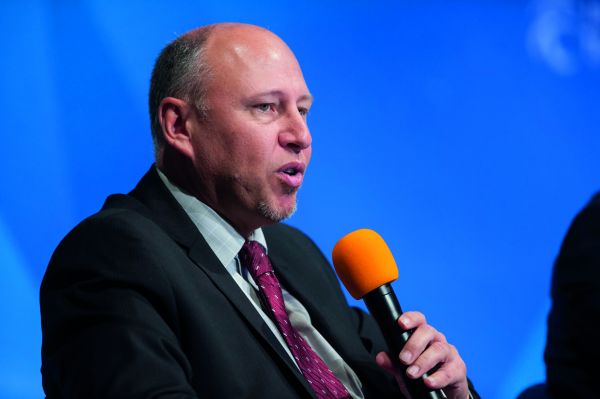TIACA: Sustainability efforts accelerating but more work on SAF needed
09 / 03 / 2023

Glyn Hughes
More action is needed to make sure Sustainable Aviation Fuel (SAF) decarbonisation targets are met.
This is the view of The International Air Cargo Association (TIACA), which said on its March 7 media day that sustainability continues to be one of its major priorities in 2023.
TIACA said new SAF incentive and investment programmes need to be developed now to meet future production and usage targets.
TIACA would like to see “increased government support” to bridge the gap between production and the amount of SAF needed, explained Glyn Hughes, TIACA’s director general.
“By the year 2050 the industry will need 450bn litres,” he pointed out.
TIACA has completed its third annual industry survey on sustainability, incorporating its eight key sustainability priorities, ahead of its Sustainability Insights Report.
The survey showed over half of the larger organisations polled are tackling SAF investment and deployment while the majority of smaller organisations said SAF is not yet applicable to them.
Airlines are leading the way with SAF deployment, with 75% stating SAF is a priority area. For ground handlers, this figure is 47%, although 40% said they “do not see a role they could play in deploying SAF”.
Freight forwarders and airports are further behind.
Over half of airports (54%) are at the ‘awareness-raising stage’, while 35% said they are making concrete efforts to deploy SAF.
Less than a third of freight forwarders confirmed SAF implementation initiatives, but there has been a marked increase in the number of freight forwarders that have done so.
“Sustainable Aviation Fuel needs to be looked at as a global solution, not just a limited solution, which it currently is,” said Hughes.
Despite the fact that far more work on SAF is needed, decarbonisation transparency has improved amongst freight forwarders, airlines and technology companies, found the survey.
Although, TIACA has noted that universal carbon reduction calculation methods should be used.
To achieve credibility and consistency, bodies that produce standards should work with industry to “collectively align on a common approach”, Hughes said.
The survey showed sustainability is becoming important for all stakeholders, not just customers.
Companies reported a clear link between support of sustainability initiatives and their reputation and attractiveness.
Most companies have a sustainability strategy and report, found the survey.
Airlines, ground handlers and freight forwarders are still working out which parts of their business they can take action in to tackle decarbonisation, whereas airports have a more consistent strategy.
“I would expect to see this year as more of a transition into a consistent strategy,” said Hughes.
The industry has made “significant leaps forward” in tackling single-use plastics, but further work is needed, he pointed out.

Photo: Shutterstock
In addition to driving sustainability in line with its BlueSky sustainability assessment, validation and verification scheme, digitalisation and partnerships are also focus areas for TIACA.
TIACA continues to work on growing its partnerships, particularly with the International Civil Aviation Organization (ICAO).
Advocacy efforts
Industry priorities include safety and security, liberalisation to support air cargo development and driving awareness of the value of air cargo.
Elsewhere, TIACA is calling on insurance markets to suspend premium surcharges to Syria in the wake of the Turkey/Syria earthquake and continuing aid work.
Regarding the Mexico government’s plan to shift cargo operations from Benito Juarez International Airport (Mexico City International Airport) to Felipe Angeles International Airport (AFIA), TIACA said carriers need to be supported during the transfer of operations to avoid disruption.
TIACA pointed out that facilities at AFIA are not yet ready, while airlines who operate both passenger and freighter operations are faced with the dilemma of whether to move all operations to AFIA, or split them and incur complex and costly transfers.
“Considering 62% of the cargo that goes into Mexico city, goes in via freighters, we would urge that where there are carriers with challenges in transitioning, we would urge the government to work with those carriers to find transitional plans that can actually support and not hinder the free flow of cargo,” said Hughes.
Hughes noted that Mexico is currently designated a category two country by the US FAA, which means it cannot introduce new services to the US, but TIACA urges further analysis to enable the country to move to category one and facilitate new operations from the new airport to alleviate lost connectivity with freighters moving to AFIA.
TIACA is concerned that operators in Latin America and Africa still face barriers to growth due to taxation, regulation, infrastructure, and lack of connectivity.
Other issues which TIACA continues to tackle include incorporating logistics and supply chains within education and training to help address the industry skills gap and staff shortages.
Hughes said TIACA also encourages the industry to align training with the remote education that the next generation experienced– using flexibility, multi-channel, modular and immersive learning methods.
Hughes added that with the rapid development of cargo drones, TIACA believes there needs to be a “proper regulatory framework that addresses safety, security and integration into existing civil aviation programmes and systems”.
ICAO is tackling this with working groups, which TIACA aims to play an active role in and anticipates drones being a “significant area of development” in the next two to five years.
Counterfeit lithium batteries still present a safety challenge and a “significant risk”, Hughes said, adding that TIACA, IATA, FIATA and other organisations believe states should form a cross-border coalition/alliance to work with industry to identify challenges.
TIACA’s growth
In 2022, TIACA recorded a membership increase of 16%. It has the biggest presence in North America and Europe, said Steven Polmans, TIACA chairman.
The association said it aimed to diversify and stabilise its revenue outside of the Air Cargo Forum (ACF).
2022 was a profitable year, and TIACA sees “reasonable growth” in 2023. 2023’s financial results are also expected to be positive and this will notably be a non ACF year, and the first of such years to be positive, said Polmans.
TIACA introduced a regional event programme strategy last year. The first event was held in Europe and the association said it would now be rolling out two regional events per year.
This year regional summits will be held in Delhi, India from March 27-29, and Nairobi, Kenya from June 19-21.
ACF saw over 3,000 unique registrants and over 6,000 daily entrance registrants from 79 countries in 2022. There were also 218 different exhibitors from 31 countries.
ACF 2024 will be held in Miami, likely in November, said Hughes.
TIACA will also be holding its executive summit in Brussels from November 6-8.














